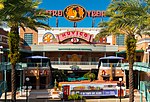Ybor City ( EE-bor) is a historic neighborhood just northeast of downtown Tampa, Florida, United States. It was founded in the 1880s by Vicente Martinez-Ybor and other cigar manufacturers and populated by thousands of immigrants, mainly from Cuba, Spain, and Italy. For the next 50 years, workers in Ybor City's cigar factories rolled hundreds of millions of cigars annually.
Ybor City was unique in the American South as a successful town almost entirely populated and owned by immigrants. The neighborhood had features unusual among contemporary communities in the south, most notably its multiethnic and multiracial population and their many mutual aid societies. The cigar industry employed thousands of well-paid workers, helping Tampa grow from an economically depressed village to a bustling city in about 20 years and giving it the nickname "Cigar City".Ybor City grew and flourished from the 1890s until the Great Depression of the 1930s, when a drop in demand for fine cigars reduced the number of cigar factories and mechanization in the cigar industry greatly reduced employment opportunities in the neighborhood. This process accelerated after World War II, and a steady exodus of residents and businesses continued until large areas of the formerly vibrant neighborhood were virtually abandoned by the late 1970s. Attempts at redevelopment failed until the 1980s, when an influx of artists began a slow process of gentrification. In the 1990s and early 2000s, a portion of the original neighborhood around 7th Avenue developed into a nightclub and entertainment district, and many old buildings were renovated for new uses. Since then, the area's economy has diversified with more offices and residences, and the population has shown notable growth for the first time in over half a century.
Ybor City has been designated as a National Historic Landmark District, and several structures in the area are listed in the National Register of Historic Places. In 2008, 7th Avenue, Ybor City's main commercial thoroughfare, was recognized as one of the "10 Great Streets in America" by the American Planning Association. In 2010 Columbia Restaurant, which is Florida's oldest restaurant, was named a "Top 50 All-American icon" by Nation's Restaurant News magazine.







